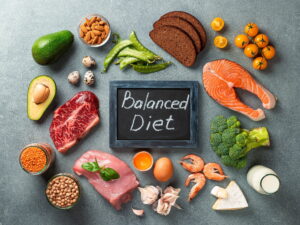Many people think losing weight is difficult and requires strict diets or extreme measures. However, a balanced diet is crucial for successful and lasting weight loss. Food is the body’s mechanism for storing energy, burning calories, and controlling hunger. A common mistake when losing weight is simply restricting calorie intake. People don’t pay attention to the quality of their food. In fact, choosing the right nutrients and adjusting your diet can help you lose weight and keep it off permanently.
How to Achieve a Calorie Deficit the Healthy Way
The fundamental principle of weight loss is that the body must use more calories than it takes in. But achieving a calorie deficit doesn’t mean going hungry or eating too little. Eating nutrient-rich foods like fruits, vegetables, lean proteins, and whole grains ensures your body gets enough vitamins and minerals, even when in a calorie deficit. Instead of focusing solely on reducing your food intake, focus on choosing healthier, low-calorie foods that keep you feeling full and happy. This makes it easier to maintain your weight without constantly feeling hungry.
Choose Whole Foods Over Processed Foods
One of the biggest problems with weight loss is that processed foods are often high in sugar, harmful fats, and empty calories. Processed foods, on the other hand, are rich in nutrients and lower in calories than other foods. Fresh fruits, vegetables, whole grains, nuts, and seeds are all excellent sources of fiber. Fiber improves digestion and keeps you feeling fuller longer. When you choose healthy meals instead of pre-made snacks, fast food, and sugary drinks, your body naturally uses fewer calories. This change alone can help you lose weight steadily and permanently.
How Dietary Fiber Helps You Lose Weight
Dietary fiber is essential for digestion and helps keep blood sugar levels stable, making it crucial for weight management. Leafy greens, lentils, whole grains, and berries are all rich sources of dietary fiber. They add fiber to your diet without adding extra calories. This means you can eat larger portions while keeping calories low and feeling good. Fiber also slows digestion, preventing hunger and overeating. Beginners who focus on consuming more fiber will naturally consume fewer calories while still feeling full and energized.
Staying Hydrated Helps with Weight Loss
People often don’t realize how important water is for weight loss, but it can help control hunger and boost metabolism. The body sometimes confuses hunger with thirst, which can lead to eating when it’s not necessary. Drinking water before meals can help you eat less and digest food better. Staying hydrated also helps your body burn fat and use nutrients more efficiently. Drinking plain water, sparkling water, or unsweetened tea instead of sugary drinks and soda can save you a significant number of extra calories while still feeling refreshed and energized.
Reduce your added sugar intake.
Reducing added sugars and unsatisfying foods is one of the best diet tips for weight loss. Candy, soda, pastries, and many processed foods provide only a short-term energy boost without any real nutritional value. They also raise blood sugar levels, causing hunger and cravings soon after eating. By reducing your intake of these foods and replacing them with naturally sweet foods like fruit or healthier snacks like nuts, you can lose weight more easily and maintain your weight longer. Reducing your sugar intake not only aids weight loss but also reduces the risk of long-term health problems, such as diabetes and heart disease.
Eat Mindfully
When it comes to weight loss, how you eat is just as important as the food itself. Many people overeat because they eat too quickly while doing other things or because they don’t pay attention to their hunger cues. Mindful eating is an excellent way to help people listen to their bodies. When you eat more slowly, chew your food thoroughly, and savor every bite, you can more easily sense when you’re full and avoid overeating. Mindful eating also helps you avoid emotional eating when you’re bored or stressed, making it easier to achieve your long-term weight loss goals.
Planning and Preparing Meals Ahead
Meal planning and meal prep are among the best strategies for following a healthy diet and losing weight. Planning your meals in advance makes it easier to avoid unhealthy snacks and last-minute meals. Preparing healthy meals in advance ensures that healthy options are always available, even on days when you don’t have time to cook. Meal planning also makes it easier to control portion sizes and contents, reducing the chance of reaching for fast food or highly processed convenience foods. This proactive strategy helps you stay on track, which is crucial for successful long-term weight loss.
Conclusion
Losing weight doesn’t have to be difficult or stressful. By following smart nutrition tips, such as prioritizing protein, eating more fiber, choosing whole foods, cutting back on sweets, and drinking plenty of fluids, you can lose weight healthily and sustainably. Eating healthy, preparing meals, and making lifestyle changes are just as important for maintaining your weight loss. Instead of looking for quick fixes, a healthier diet can help you lose weight and keep it off, leading to a healthier and more confident you.
FAQs
1. What are the best nutrition tips for weight loss?
The most important thing is to eat nutritious, low-calorie foods. This means eating whole, unprocessed foods and avoiding processed and sugary foods.
2. How much protein should I consume to lose weight?
Most adults should consume 0.8 to 1.2 grams of protein per kilogram of body weight per day, evenly distributed across all meals. However, this varies from person to person.
3. Can I still eat carbohydrates while losing weight?
Yes, carbohydrates are a beneficial source of energy. Instead of refined carbohydrates and sugary foods, consider whole grains and fiber-rich carbohydrates like oats, brown rice, and quinoa.
4. How long does it take for dietary changes to show results?
Some people feel better, have more energy, and experience less bloating after just a few weeks. However, it usually takes one to three months of consistent effort before you see weight loss results.
5. Do you have to give up all your favorite foods?
No, eliminating your favorite foods makes you crave them more, which leads to eating more. It’s best to indulge in small bites occasionally, but make healthy choices most of the time.




